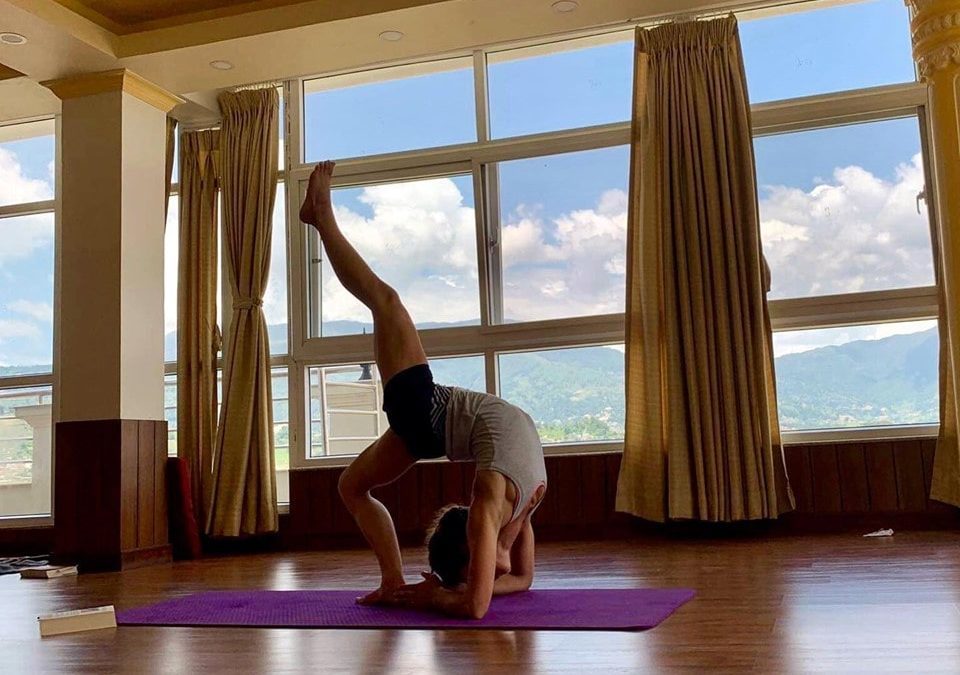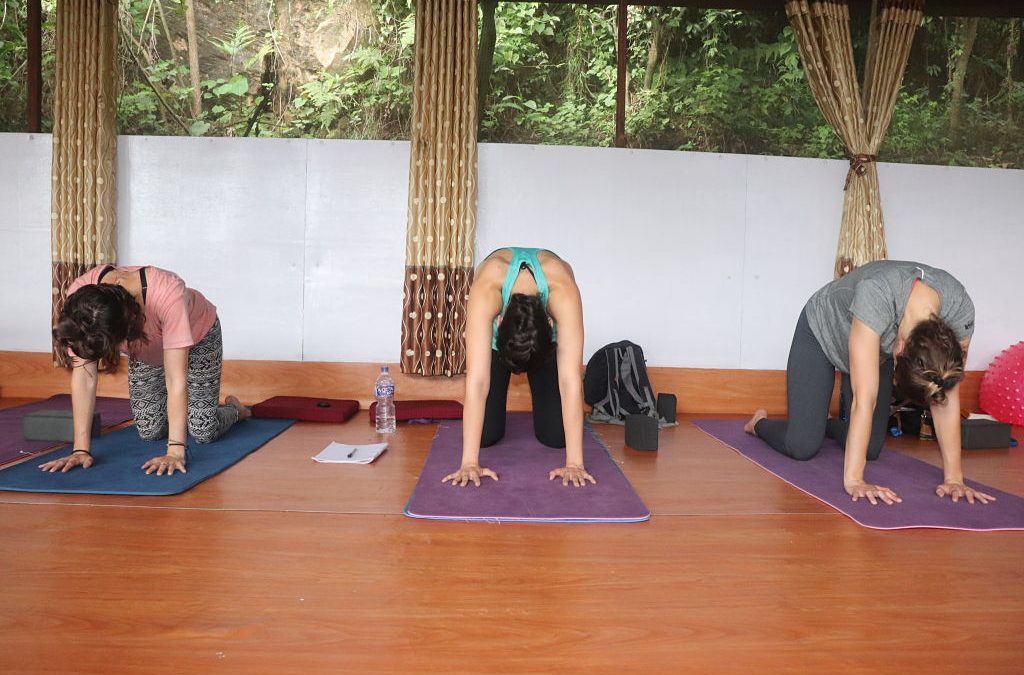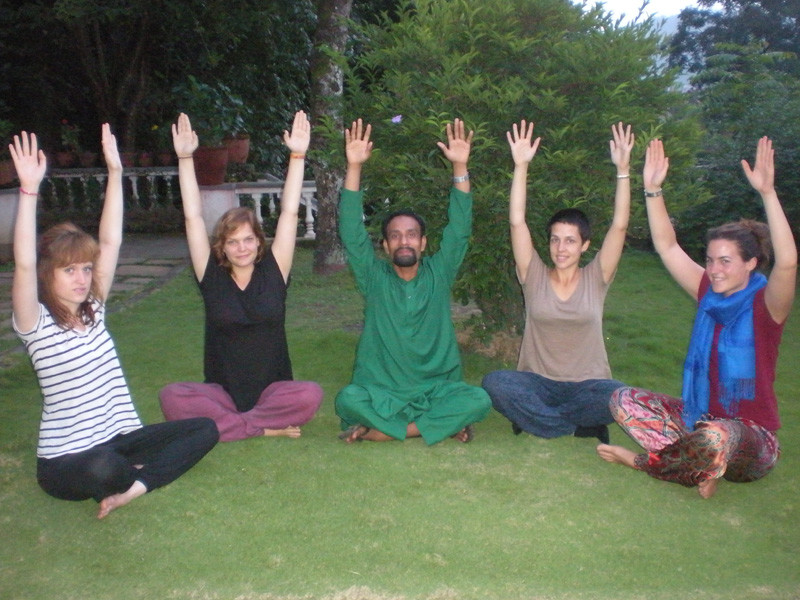
by Tirtha Acharya | Oct 19, 2020 | Uncategorized
We Fully Support You After Yoga Teacher Training With Us
The journey from a yoga novice to a yoga teacher is filled with many ups and downs. To make your adventure memorable and enticing, the yoga teacher training course proves immensely helpful. After finishing the course, students often find themselves perplexed and confused as to what to do next. Fret not! Nepal yoga home is there to provide you support after yoga teacher training!
You might be wondering what kind of support will we provide? Well, that’s what this blog is all about. We will try to provide the readers with viable solutions as to the supports we offer. If you feel that you must meet us, then our doors are always open for you. So, here is a brief description of the services that we provide.
1. We maintain a strong relationship of guru sisya tradition
In the Hindu culture, there exists a tradition of holding one’s teacher in high regard. You might have heard the story about the student-teacher relationship of Dronacharya and Arjun. The bond between the yoga teachers and students does not go that deep here but we hold the relation between student and teacher in high regard.
Even after completing the course, you can call the yoga teacher to ask for assistance. The yoga teacher will assist you if it is within his reach. Helping students at the time of need is a classic example of support after yoga teacher training.
2. Students can ask any questions on their difficult time for the solution after yoga teacher training with us
Yoga is a continuous process and even after completing the teacher training course, you should study it. The problem that many students face is that while self-studying, they encounter setbacks. It is either a technical problem or a conceptual problem. In such cases, only a yoga teacher will be able to help you. You might be thinking that my teacher might get irritated if I ask him again and again.
Well, in Nepal Yoga Home, our teachers are more than happy to solve your queries. They will try their best to provide you with the answers you are searching for. This type of support after yoga teacher training is rare and you won’t find it any other yoga training facilities.
3. we provide recommendation letter whenever they need if they truly follow our program structure
If you decide to develop a career in yoga, then we as ‘teachers’ will be very happy for you. Nothing brings joy to us than the sight of our students achieving success. With that in mind, we try to help our students as much as possible. We provide recommendation letters for our students provided that they abide by our program structure. Furthermore, if you display exceptional skill and prowess, we’ll make sure to highlight that.
4. Help them to grow their schools if necessary after yoga teacher training
If you want to commercialize your yoga skills by opening a yoga school, then feel free to ask for help. In this support after yoga teacher training, we provide the students with valuable tips and ideas. By using these ideas, they can elevate the level of their yoga schools. Not only that, but we also aid in curriculum planning and other crucial matters.
5. If interested, we can work in their country by doing partnership
For students that want to establish a yoga school in their native country, they can contact us for partnership. We are always on the lookout for diversification and if you feel that we have the skills, then we’ll look into partnership. By partnering with us, you’ll get access to unparalleled yogic knowledge and life skills. We will be able to make great progress if you join hands with us.
6. In the future, they will get 15% off in all program we offer
Another support after yoga teacher training is that if you take another program, we shall provide you a 15% discount. By availing this facility, you get access to amazing facilities that are too good to pen on paper.
7. Support you to be a register yoga teacher
We help you how to become an internationally qualified yoga teacher i.e Register Yoga Teacher (RYT) by joining the yoga alliance community after the teacher training program with us.
Nepal Yoga Home holds its students in high regard and always works to provide them unmatched service.

by Tirtha Acharya | Oct 7, 2020 | Uncategorized
15 Hacks On How To Be happy?
Happiness is a weird concept. Everyone in the world wants to be happier. Everyone from beggar to king, poor to billionaire no one can say they are perfectly happy and are still trying to be happier than they currently are. You can never have complete and utter happiness but you can definitely be happier than you were.
Here are the 15 hacks on how to be happy:
1) Exercise
Research suggests physical exercise decrease anxiety, the stress in the body. Firstly physical exercise helps to control your weight, reduce the risk of cardiac diseases, improves the mood and attitude of a person. Furthermore, When you do a physical exercise the excess fat on your body will be removed. This results in a well-ripped body and who wouldn’t be happy with a well-ripped body looking best you can.
2) Traveling
Travelling makes almost everyone happy. Traveling and taking a break from your mundane environment can add a spark of happiness in your life. For instance, the cause of unhappiness in some 10 to 5 working people can be the monotonous day to day activity, if that is the cause traveling is the answer for your how to be happy question.
3) Escape social media
Social media is a double edge sword, if you won’t use it wisely it will likely harm you. The social media world is mostly exaggerated, most are not what they show in this world. In this glitter people, non-voluntarily compare themselves with others and kill their happiness. If this is the case you should take a break from social media or should put a limitation on how much to use.
4) Spend time with your elders
Our elders have spent more time in this world than us and they know more about this world than us. In other words, take a time to spend it with your elders and family. At the end of the day, they are among the few in this world who care for you. If loneliness causes your unhappiness they are your key to how to be happy.
5) Good company a great way on how to be happy
You certainly are what you surround you with. If your friends are without ambition, drains your happiness, discourages you then its time to find a better crowd for you. However, you also must be one to encourage and care for your friends. You must also be that kind of friend that you hope your friends are.
6) Clear goal and ambition
Sometimes the cause of your unhappiness is aimlessness. You see your colleagues and friends walking towards their dreams and you may feel a bit left out. But above all, you should focus on yourself and work very hard and have faith eventually you will get everything you worked hard for.
7) Clean your surrounding
It looks a bit odd comparing other ways but a tidy and clean environment has more effect on you than you would imagine. Positive and clean surroundings have a positive and fruitful effect on you. Wake up and clean room before going to work or study, even if the day goes wrong and bad you would still have a tidy surrounding and clean bed to return to and that can improve your mood.
8) Develop healthy habits
A good habit can have a lifelong impact on you. For instance, you can give up smoking or drinking, this will improve your health and others around you, save your money, furthermore even discourage your children or friends to quilting drinking, or smoking. Its never too late to adopt healthy habits.
9) Learn new skills
For some elderly and peoples, life can be lonely. Loneliness can cause severe unhappiness. The lonely time with yourself becomes too much of a burden to bear. If you are going through that you can use your time for learning new skills, recreational activities. May be learning is the remedy for your how to be happy?
10) Yoga and meditation
Simply putting yoga is the series of postures done for better mental, physical health. Yoga and meditation classes can reduce stress, anxiety, and even boost the confidence level in you. It was found that people practicing daily yoga and meditation were more happy, stable, and energizing than their non-practicing counterparts.
11) Sleep more
Sleep is the best natural medicine that our body has. Sleep heals you mentally and physically. It gives proper rest and recharges your body. A good night’s sleep can improve your mood and attitude hugely. To think it like that it is better to sleep than keep overthinking about worthless things. Maybe a peaceful good night’s sleep was all you needed for how to be happy query.
12) Help others
Helping others and involving in volunteering as well as charity acts immediately improve our mood. It makes you generous and gives you a positive feeling. It will inspire your children to be more kind to the less fortunate ones. Maybe a little bit of charity and a voluntary act was needed all along for you to be happy.
13) Communicate
Communicating is the key to solving many kinds of disputes. A dispute between two individuals is sometimes the cause of unhappiness. Not every time but sometimes not expressing their thoughts creates a barrier between the peoples. So talk communicate and may become to a mutual agreement.
14) Make an effort
Living life means you have to constantly give effort to many things. You have to give effort to your relationship, job, family, friends, goals. Instead of giving up on small obstacles you should push harder. May be things that will give you immense happiness is just an effort away.
15) Be happy with what you have
The last and the most important key to being happy is to be happy with what you have. This doesn’t mean you shouldn’t pursue excellence, wealth, and dreams. Dream and work hard but the goals should be within your field of vision and it should make you happier not the opposite. Maybe what you have already makes you happier than what you think gaining will make you happier.

by Tirtha Acharya | Aug 29, 2020 | Uncategorized
10 Reasons Why Yoga Teacher Training In Nepal
Nepal being home for yoga offers best among the best studios for beginner and advanced yoga teacher training. Yoga teachers’ training in Nepal is a wonderful opportunity to swim deeply into a mixture of ancient and modern art of yoga. Nepal provides scrupulously garnered courses for enthusiastic yoga learners or teachers who carry a soul purpose of enlightenment through yoga.
Those who want to light up their crown chakra with the help of yoga are always invited to Nepal. Nepal is not only an amazing place for yoga but the picturesque place in the lap of Himalayas always attracts people. Yoga studios in Nepal try their level best to provide the finest yoga teacher training. Yoga and meditation is the best way to heal your mind and body will be better than the best if you learn it in Nepal.
1. Many options to choose
There are so many yoga studios in Nepal providing yoga teacher training course. Nepal Yoga Home is one of them. This yoga school in Nepal is providing different yoga courses for a long time. Nepal yoga home is a renowned yoga studio, which offers the best service with the most qualified masters, the guru is, and the whole team. Nepal yoga home is the choice of so many people.
It is the only place where the graduation rate is very high. Yoga students all over the world visit Nepal to be a part of this studio and learn yoga from here. Each place has its uniqueness, which allures the world. Same as that Nepal yoga home has been an exclusive place for many exceptional reasons.
2. A safe environment is a next point for why yoga teacher training in Nepal
Nepal yoga home offers a safe family environment for all learners. Learning and practicing yoga in a peaceful environment surrounded by greeneries and nature will be the biggest and point for yoga learners. Nepal Yoga Home provides a clean and peaceful environment. We have plenty of free space for the practice of yoga.
So you can also engage yourself in self-practice. We do care about your health issues, your problems, and even tiny things related to our students. We try to comfort them, attain them personally if they need help, and help them in every aspect of their traveling after arrival from the airport.
3. Homely environment
We believe in teamwork and every member of our team will make sure to comfort our learners. Being the best place in Nepal for yoga teacher training, Nepal yoga home teaches multiple styles of yoga and meditation. All the expert team of yoga will not only teach you meditation and yoga but will also share their experiences as a yoga teacher.
4. Internationally accredited
Nepal yoga home is among those few studios, which have been registered from all the yoga alliances: yoga alliance the US, yoga alliance Australia, yoga alliance India, international yoga alliance, world yoga alliance, and yoga alliance Italy. Therefore, its certificate is valid all over the world. Apart from this, Nepal yoga home is the first registered yoga school in Nepal certified by international yoga alliance. We are also the first yoga center to offer Astanga vinyasa yoga in Nepal.
5. Serene milieu
This is an ideal place for deep introspection, self-relaxation, and yoga. The majestic opportunity of being an irreplaceable part of Nepal yoga home should not be missed. We come with the perfect program in every sense making you explore all the necessary yoga and meditation styles.
We always try to embark on a unique expedition of yoga and spirituality. We offer a holistic approach of training including all dimensions of yoga. Our course includes yoga poses, meditation, breathing, philosophy, chanting, relaxation, detox, lifestyle, anatomy mudra, etc. This can be very helpful in the yoga teacher-training program. If you want to be a yoga teacher then these things will help their best in your future.
6. The scientific way of learning
Nepal yoga home is a true yoga and meditation-learning center based on both classical and scientific research. We focus on authentic teaching and learning based on both ancient and scientific way. We are the pioneer yoga school in Nepal with outstanding yoga classes and a life-changing environment to offer all the yoga lovers.
7. Affordable
We provide Yoga teacher training in a reasonable and affordable price. Normally, it costs you 5 to 10 times more in the western world even you get a better traditional and authentic class in ours.
8. Learning by doing
We focus on both teaching the classes and giving assignments, practical demonstrations among other students. It increases students’ confidence and they learn the classes by doing.
9. One to one teaching
In case of confusion to students, we also provide one to one teaching. But normally, we teach in a group. One, who didn’t understand get the private time with our expert instructor.
10. Benefit guaranteed
Last but not least, the reason why yoga teacher training in Nepal is you will be definitely be benefited after the course. We have proof of 1000+ students have changed their life completely. 100+ studios are opened by our students after graduated from here. It definitely helps you even if you are going to be a teacher or just want to heal your and family’s health condition.

by Tirtha Acharya | Dec 10, 2018 | Uncategorized
Many questions are being raised regarding Ayurveda and yoga. Actually, Ayurveda and yoga are complementary to each other. The relationship between yoga and Ayurveda is like nail and nail-muscle. One becomes incomplete without another’s presence. To make clearer, the relation of yoga and Ayurveda can also be described as two sides of the same coin. Veda is the root of these both sciences, address disease eradication, health, and all-round progress including spirituality. Ayurveda is the healing facet; yoga is the practical and spiritual aspect of the Vedas. Mutually they account an overall accessibility to the soundness of the body, the mind, and the soul. Some people arguing that Patanjali is the father of yoga, while Charaka normally considered as the father of Ayurveda, so how there is the same origin for Yoga and Ayurveda. The reality is- many people studies Veda; some teaches the knowledge of yoga while another provides knowledge on Ayurveda. Another probable reality is- one and the same person is known in the Vedic period by various names during his peregrination to ravel the schoolings of these primitive lores.
The histories of many yogis reveal that they have learned when they went to forest and caves for a higher practice of yoga, about many types of herbs, plants and other natural processes to heal the body and energize it. Some of the herbs were found to be very powerful to save the life of a person and to give accomplishment. Laxmana was given a herb named “Sanjivani” when he was near to death. Then Laxman was cured by Sanjivani. The yogis used to take the support of ayurvedic herbs and process during their practice. They used to eat, drink and live the life according to Ayurveda rule which leads them to final success. They helped humanity for bestowing health through the Ayurveda. In the ancient time, there was the perfect method of Ayurveda for curing diseases and remaining healthy. A short hint of herbal medicine is given in the chapter Kaivalyapada, Patanjali yoga sutra. It shows Ayurveda is always applied in yoga. Thus, it is clear that yoga and Ayurveda are inseparable entities to each other.
Both sciences, yoga, and Ayurveda, have parallel tenet: a complete well-being of an individual and the motive of helping an individual re-join to their true and original nature through their direct experience. Yoga sets up the body and mind for definitive emancipation and enlightenment while Ayurveda expounds the several natural methods to keep the body and mind salubrious. Ayurveda and Yoga, both underline our nigh relationship with nature and how to change our environment a way to harmonize with our recondite and deepest nature.
Many people in today’s world think as “asanas (posture) only,” something like a stretching and exercise medium to keep the body resilient and brisk. People are exerted to yoga as an aisle to keep agile even though the purpose of the physical practice of yoga is to help the mind to become spotless or pure and generate higher mind-body awareness. A clean mind is not swayed by stress and gives the output as a healthy body begetting unification with one’s own dinkum, essential nature. Suchwise, Ayurveda gives knowledge of how to maintain the body healthy and how this likened to one’s spiritual path. Ayurveda allocutes our overall lifestyle including various exercises and yoga. However, Ayurveda is extremely individualistic and perceives each person as peerless and an individual’s way toward complete health as a unique path. In other words, each has an identical and original path for perfect health. Hereupon, what is better for each individual is unexampled, nonpareil and unique to that individual alone. This is depictured as an individual’s unique hereditary background composing or dosha (Vat, Kaf, Pitta) in Sanskrit. A person’s constitution depicts who the individual is at the ultimate basic level. Ayurveda treats as per the individual’s fundamental level.
The above concept is noticeable as modern healing systems have also become fruitful as they understood the concept of the unique constitution to each individual nature. This helped to rectify different mistakes of modern healing systems. Ayurveda rejects the “Fits all” theory, is confess the principle that “nothing is right for everyone and everything is right for someone.” Thus, Ayurveda is rooted upon accepting personal requirements and what is good only for the person – not the crowd – and acquiring those needs to establish perfect adjustment.
Ayurveda not only sheds light on the diet, herbs, colors, aromas, etc but also in specific yoga asanas to reveal the best one and important asanas for each person based on his/her constitution. A practitioner of hatha yoga can choose the best practice for a harmonious balance of energy and health with the reference of Ayurveda. Some yoga postures are good for one individual while the same pose can cause greater imbalance for another. Ayurveda helps to know one’s constitutional composition so that the individual can apply constitution-specific asanas to converse their imbalances and ameliorate their health and wellbeing. Verily, if we know our constitution, we can manage our selections and choose only those that will helm optimal health.
Now the question arises- how to know inherent constitution? If you are visiting in Nepal, you have the best option to learn everything in Nepal Yoga Home. Other several alternatives are health journals or websites that analyze your constitution according to your answers to a particular set of questions. Yet, sometimes there can be some chances of errors. So, do not rely solely on this remark unless you take guidance of a certified and experienced Ayurvedic doctor. If you are aware and conscious on your body you will be able to listen to your body and realize the constitution. If you are planning to change asanas, diet or lifestyle for harmonious life, you first consult with an Ayurvedic Health professional then only jump in it.
To sum up, we can say that both Ayurveda and yoga are divine science, a natural gift from the existence to bestow a happy and harmonious life and proceed towards the real aim of life.

by Tirtha Acharya | Apr 7, 2018 | Yoga, Uncategorized, Yoga Therapy
The word “yoga” is derived from the Sanskrit word yuj means “union”. Yoga is a union of mind, body and soul. It is the peaceful and calmness situation of one’s state mental and physical state. Yogi is a male who practices yoga while a female is yogini. Today yoga is a form of physical postures that purifies the body and provides physical strength and stamina. These physical strength and stamina is required so that yo can engage in meditations for long period of time. You should practice under a yogi. Nepal Yoga Home, a pioneer yoga retreat in Kathmandu, offers best yoga class in Kathmandu. Read on to find out the benefits of yoga as well as why we have the best yoga class in Kathmandu.
Due to outstanding performance and spiritual life-changing environment to offer, Nepal Yoga Home has the best yoga class in Kathmandu. Yoga aspirants from all around the world flock to yoga class in Kathmandu. It offers various courses ranging from beginners level yoga class to the advanced level yoga class. This yoga studio in Nepal is run by the yogis. The yogis of Nepal yoga home are dedicated to spread the benefits of yoga all round the world. We will teach you what is the main consideration for a human being. It is necessary to have a harmonious life. It provides the proper art of living methods and techniques. In this yoga class in Kathmandu, you can rejuvenate your physical body as well as calm your mental states. The best part is that this yoga class in Kathmandu is just five kilometers from the main city center.

4 Benefits of Practicing Yoga
Yoga practice benefits the body
Through best yoga class in Kathmandu, you can make your body stronger, increase flexibility, perfect your posture and protect your spine. The practice of yoga increases your blood flow, ups your heart rate, drops your blood pressure and rejuvenates your body, mind and soul.
Yoga practice brings balance
Yoga brings balance in your body through thoughts, words and actions. It cultivates a deep experience of outer and inner balance so that the rhythm of your body matches and you feel peaceful. There is constant conflict between our inner soul and outer body. The yoga class in Kathmandu exactly fulfills this void and you will be able to lead your life peacefully.
Yoga practice invites mindfulness
In the yoga class in Kathmandu, we will teach you in a way that you will be able to know your self. Yoga is an important tool to know your-self. It teaches you to stay in the present moment. Yoga class in Kathmandu teaches you to accept yourself in the way you are. In addition to that, it helps you to focus and be mindful of the situation around you. Yoga relaxes your system and maintains your nervous system.
Yoga practice is freedom
First of all, you need to know that, Yoga is the way to to find freedom. You need to find that freedom from within. Yoga class in Kathmandu helps you to be brave so that you will be able to look within. It can help you change your life. In yoga, what you do to yourself matters, after a trial at yoga class in Kathmandu you will start feeling better. Also your self esteem is rejuvenated and you will experience your life in a whole new level.

Experience Yoga at Best Yoga Class in Kathmandu
Nepal Yoga Home has been offering yoga class in Kathmandu since very long period of time. Apart from yoga training, Nepal Yoga Home also provides yoga teacher training from beginner level to advanced level. Other facilities for yoga and meditation in Nepal are also available in Nepal Yoga Home. In this article we will explore the three main reasons why yoga class in Kathmandu is best at Nepal Yoga Home.
Perfect Location and Yogic Food
Nepal Yoga home is situated in the enclosure of the Nagarjuna jungle. The Nagarjuna jungle is itself named after the enlightened monk. The closeness to the nature at yoga class in Kathmandu will hypnotize you to remain cool, calm and balanced. The local and organic foods is served during your stay. Nepal yoga home grows some of the vegetables themselves beside the hall. At yoga class in Kathmandu, you can experience the vegetarian and sattvic meal during your stay. Furthermore, the food is in highly sanitized condition and delicious to eat.
Affordable and Economic Fee with Welcoming Hospitality
Nepal Yoga Home is on a mission. The mission is to spread the benefits of yoga to all the people of the world. For this reason, the fee of yoga class in Kathmandu is affordable and economical. The course of yoga class in Kathmandu is not only low cost but also you can get well managed rooms. We have managed everything for you so that you can have a yogic lifestyle. Furthermore, the hospitality of the Nepali people is unquestionable. As a visitor and learner in yoga class in Kathmandu, you will get total respect. You can ask any sort of help that you require. The local language is Nepali but also English is widely spoken. You can ask for directions easily and people will always smile. Don’t forget to say, “Namaste”
Experienced and Professional Yogi as Teacher
Yoga class in Kathmandu has the experienced and affectionate teacher. They will also do their best to share idea and skill. The teaching style of yogis is also inspirational. In addition to that, you can get some really helpful insights so that your learning is useful. The manner of teaching is also eastern style at Nepal Yoga Home. In yoga class in Kathmandu, you can have the different flavors of learning experience. Each yogi will have a different style and you will get to learn from all of these.
by Tirtha Acharya | Feb 7, 2018 | Uncategorized
Four Purusharthas in Hinduism: Dharma, Artha, Kama, Moksha
The people have different types of desires and goals, Hinduism describes it in four Purusharthas. They keep laboring hard to achieve their desires (Purusharthas). Sometimes people cannot differentiate between desires and real goals. All people do not have known what to do and what not to do with their desires and goals. So they puzzle in their life due to ignorance Desire with a blind mind may create a sin. Greed and desire are said to be the root of all sins. So, Hindu and yoga philosophy has given a proper guideline for legitimate goals. This is a Vedic philosophy which has elaborated four aims (Purusharthas).
Yoga’s (Ashtanga Yoga, Kripalu Yoga, Bhakti Yoga, Karma Yoga, Siddha Yoga, Tantra Yoga) four aims (Purusharthas) of life are common for entire human beings of the world. The aims are Dharma, Artha, Kama, and Mokshya. In Sanskrit, they are referred as “four Purusharthas” four courage of life. These are not important only as an individual quality or need; but they are equally important to flourish one’s potentialities allowing living happier, healthier and fulfilled life. It is the foundation to grow and uplift spiritually.
Dharma (Duty)
First Purushartha is known as Dharma has very vast and a multitude of meanings. The normal translating words, for ‘Dharma’, are religion, truth, righteousness, wholesomeness etc. These all meaning coincides moral and spiritual duty. Each and every activity of people should be non-harming, non-irritating for other. The work, duty or activities which are favorable for one-self and other is said as Dharma. People mistakenly believe that they should do spiritual work, prayer, worship etc to do dharma. This has resulted in suffering.
Some think theists perform dharma but an atheist cannot. It is not a correct concept. The so-called theist, if does harmful deeds; it would be against dharma. Whether you believe in god or not, but out action of body, mind, and speech should be directed towards the welfare of all. It is the activity which is justice for self and other. It seeks the justice. Dharma has both gross and subtle meanings. For the inner world of an individual, the word ‘Dharma’ gives subjective meaning. It may differ from one person to another person. It also differs from one situation to another situation. However, it seeks to be true to the self and other.
Dharma is a law of Nature. For example, Sun shines, planets revolve around the sun. It is much more than religion. It has nothing to give and take from the narrow religious idea, faith. In fact, Dharma is free from religious doctrine. Dharma cannot be imprisoned within the theory of religion. To walk on the path of Dharma is doing what ought to be done. The law of nature always gives a positive result. It seeks the sustainable and true benefits of all. Dharma takes people at the top when followed properly.
Artha (Worldly gain)
It does not mean that people have to earn a lot of wealth. It means to earn in a systematic and right way. It suggests to be prosperous but keeping the dharma in mind. Prosperity is essential to lead a happy life. Earning in a wrong way is not a proper duty. The householders need to earn for the livelihood of all family members and whoever are dependent on them.
If they earn in excess amount their duty is to donate to the needy people. It is a good rule that a person has to donate the one-tenth portion of his earning. They have to maintain a progressive status to improve both dharma and artha simultaneously. The word ‘artha’ also gives the meaning earthly recognition. The prestige, name, fame, sound relation in the society etc are the earthly gain.
Another important worldly gain is good health. Unless one is healthy, he cannot achieve the goals of life. Being healthy all the time is itself of treasure. It is the basis and foundation for performing any work.
Kama (Physical and Sensual Pleasure)
Hindu philosophy also includes the worldly pleasures, including sexuality, love, marriage, arts, music, food, etc during the second stage of life. It includes innate urge as well in order to attain one’s ambition. Achievement of these aspirations is linked with Kama. It is the lord of desire to enjoy the life in the fullest extent. Kama also refers the relationship with the higher concept of beauty through artistic expression. However, during the achievements, one should sincerely observe the dharma. Anything which is acquired in absence of Dharma will take towards misery.
Most of the people perceive Kama as a sexual pleasure. However, it has a broader meaning. Actually, anything that brings joy and pleasure in our life is Kama. If one completely tuned at present, live in present, then he acquires real pleasure. At the highest stage of Kama, we connect to our higher self or divinity. It is a conscious stage at the present moment.
Moksha (Liberation or Enlightenment)
At the fourth stage of life, after having all the experience of the world, human have to strive for liberation. Fixing dharma as a basis, if one has achieved the first three Purusharthas, gradually a time appears when one surpasses them. If Artha and Kama are based on Dharma, then attaining the final aim i.e. moksha will be easier. As one goes through the first three goals, he will realize that there is no permanent happiness in them.
So, he feels that source of eternal peace and joyfulness should be sought. But, if there is not a good foundation, then moksha is impossible. Actually, Mokshya is the liberation of freedom from the recurring births into the body after destructing all the karmas. It requires a higher level of wisdom and self-realization. It is the realization of highest truth.
These four aims (Purusharthas) are incomparable to each other. Each of them has its own importance. Each helps other to reach the final destiny. They are like the legs of a chair, all are equally important for the existence of chair. They are the pillars of a fulfilling life. They interweave each other. However, first three Purusharthas are the gear to approach the fourth. When the people start striving towards these Purusharthas, life becomes happier and easier. The life will be incomplete without achievement of these Purusharthas. The success of life is hidden on the achievement of the four aims.







